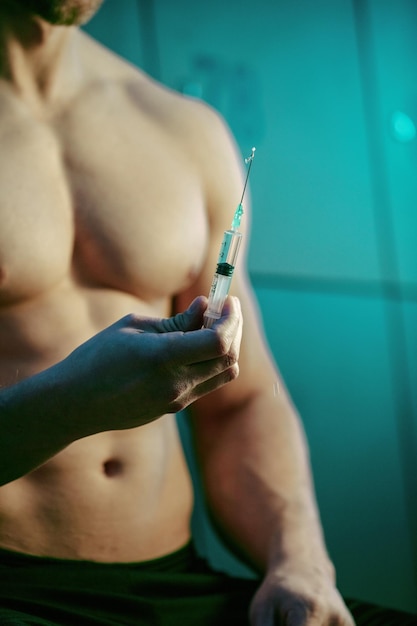
### What Are Testosterone Injections?
Testosterone is a naturally occurring hormone primarily produced in the testicles in men, while smaller amounts are made in the ovaries and adrenal glands in women. Testosterone injections are used to address hormone-related health issues such as impotence, delayed puberty, and hormonal imbalances in men.
### Uses of Testosterone Injections
Testosterone injections are typically prescribed when the body doesn’t produce sufficient levels of this hormone on its own. Testosterone plays a vital role in male development, including the growth of genitalia, muscles, and bones. It also supports normal sexual development. Medications that include testosterone fall under a class of drugs called androgens, which work to restore normal body functions by addressing hormonal deficiencies.
In some cases, testosterone injections are also used to treat breast cancer in women. The medication is usually injected into a muscle in the buttocks as prescribed, typically every one to four weeks. Importantly, it should not be injected into veins. The appropriate dosage is determined by a healthcare provider based on medical conditions, blood testosterone levels, and individual responses to treatment.
If you are self-administering, closely follow instructions provided by your healthcare professional. Always inspect the medication for discoloration or particles before use. For it to be effective, use the medication consistently as directed by your doctor.
It’s crucial not to overuse testosterone injections. Excessive use can stop the body from producing its natural testosterone and may cause withdrawal symptoms like fatigue, depression, or weakness. Misuse for purposes like muscle building can lead to serious complications. Overdosing on testosterone can result in severe health issues, so use caution and only follow your doctor’s guidance.
### Types of Testosterone Therapies and FDA Recommendations
Testosterone medications are available in various forms, including gels, topical solutions, transdermal patches, buccal patches, injections, and pellets. While testosterone drugs have been approved by the FDA since the 1950s, guidelines restricting their use were issued in 2014, limiting their application to specific medical conditions. Additionally, a 2015 FDA warning highlighted the potential risk of heart attacks and strokes associated with testosterone replacement therapies.
### When to Avoid Testosterone Injections
Certain medical conditions make testosterone injections unsuitable, including:
– Prostate cancer
– Male breast cancer
– Severe liver disease
– Serious kidney disease
– Serious heart conditions
– Pregnancy
If you have conditions like an enlarged prostate, diabetes, heart disease, prior strokes or blood clots, high cholesterol, liver or kidney issues, or are on blood thinners, you should use testosterone injections under careful medical supervision.
### Side Effects of Testosterone Injections
Some serious side effects may occur, such as hives, difficulty breathing, facial swelling, nausea, vomiting, skin discoloration, swelling in the ankles and feet, or pain while urinating. In severe cases, side effects like rapid weight gain, shortness of breath, chest pain, blood clots, high calcium levels, and liver problems can develop.
In women, side effects could include irregular menstrual cycles, increased body hair resembling male patterns, a deepened voice, and an enlarged clitoris. Some of the common side effects for all users include acne, site pain, headaches, fatigue, mood swings, insomnia, and fluctuations in libido.
Other drugs, including insulin, blood thinners, and corticosteroids, may interact with testosterone injections. Combining these improperly can lead to further complications.
### Warnings and Precautions
Before starting testosterone injections, inform your doctor about all medications and supplements you’re currently using, including herbal remedies and over-the-counter products. Those with breast or prostate cancer, or a history of conditions like heart failure, sleep apnea, or significant fluid retention caused by organ issues, should avoid using testosterone.
Additionally, testosterone can harm unborn or breastfeeding children, so pregnant or nursing individuals should consult their doctors before use. An overdose of testosterone not only increases physical health risks but may also lead to mental health concerns, including mood swings and depression.
### Conclusion
While testosterone plays an essential role in regulating the body and addressing certain medical conditions like impotence and delayed puberty, it can have severe consequences if used incorrectly. Both deficiencies and overdoses can result in harmful side effects, ranging from physical conditions like edema and heart issues to psychological impacts.
Many abuse testosterone injections for muscle growth, but the associated risks, such as heart attacks and other serious complications, are often overlooked. Patients, particularly those with pre-existing medical conditions, should only use testosterone injections with proper medical oversight. When used responsibly, testosterone can significantly improve the quality of life and overall health.